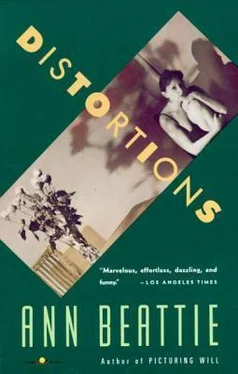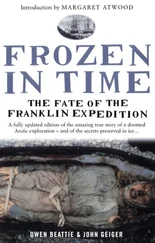Ann Beattie - Distortions
Здесь есть возможность читать онлайн «Ann Beattie - Distortions» весь текст электронной книги совершенно бесплатно (целиком полную версию без сокращений). В некоторых случаях можно слушать аудио, скачать через торрент в формате fb2 и присутствует краткое содержание. Год выпуска: 1991, Издательство: Vintage, Жанр: Современная проза, на английском языке. Описание произведения, (предисловие) а так же отзывы посетителей доступны на портале библиотеки ЛибКат.
- Название:Distortions
- Автор:
- Издательство:Vintage
- Жанр:
- Год:1991
- ISBN:нет данных
- Рейтинг книги:5 / 5. Голосов: 1
-
Избранное:Добавить в избранное
- Отзывы:
-
Ваша оценка:
- 100
- 1
- 2
- 3
- 4
- 5
Distortions: краткое содержание, описание и аннотация
Предлагаем к чтению аннотацию, описание, краткое содержание или предисловие (зависит от того, что написал сам автор книги «Distortions»). Если вы не нашли необходимую информацию о книге — напишите в комментариях, мы постараемся отыскать её.
Distortions — читать онлайн бесплатно полную книгу (весь текст) целиком
Ниже представлен текст книги, разбитый по страницам. Система сохранения места последней прочитанной страницы, позволяет с удобством читать онлайн бесплатно книгу «Distortions», без необходимости каждый раз заново искать на чём Вы остановились. Поставьте закладку, и сможете в любой момент перейти на страницу, на которой закончили чтение.
Интервал:
Закладка:
He put on his blue swimming trunks and walked to the bathroom. It made no sense to have put them on, because he had to pull them down to urinate. He flushed the toilet — his pig roommate, a former waiter who had worked himself up to maitre d’ at the Cliff House this summer — couldn’t even be bothered to flush the toilet. The lifeguard felt himself getting angry. He went to the kitchen and took a peach out of a bag on the counter. He rolled the peach back and forth on the counter, but didn’t eat it.
In the bedroom, the lifeguard examined himself in the mirror. His lips were puffy from too much sun. As awful as it felt, he should put zinc oxide on his mouth. There was a half-full glass of water on the dresser, and the lifeguard dipped his comb in the glass and combed his hair back. He had seen pictures of men in the thirties and forties who slicked their hair back that way. It didn’t matter what the lifeguard did to his hair; the early-morning mist and the hot sun would make it fall into his eyes.
A thought came to the lifeguard on his way out of the bedroom: you might also have looked at that glass as half empty.
He put on his sandals and went out. It was a steamy morning. The cloudy sky might mean rain, or it could just be overcast all day. Half the summer was gone. It was the fifteenth of July, and at the end of August the lifeguard would return to Dartmouth to begin his senior year as a mathematics major. Before becoming a mathematics major, he had been a political-science major, and before that a psychology major. His girlfriend, who was a waitress at the Cliff House — who associated with his pig roommate every day and who thought he was a “nice guy”—was studying art and thinking about becoming an interior decorator. She was a Lutheran, and on Sunday she always went to church. The lifeguard felt himself getting angry.
He walked through the parking lot and across the wooden planks leading to the beach. There was a woman sitting on a blanket on the sand, with a child sleeping beside her. It was windy, and the woman held the edge of the blanket up so that sand wouldn’t blow in her child’s face.
Later, her name, Toby Warner, would be as familiar to him as his own, but today he didn’t know, or care, who she was. It was the fifteenth of July. The ocean was slate-gray. The seagulls flew over the shoreline as unpredictably as rolled dice. He took a little tube of zinc oxide out of the pocket of his blue shirt — a button-down, wouldn’t be seen dead in it anywhere but on the beach — and smoothed it over his lips. He took the chain with the whistle on it out of the same pocket and put it around his neck.
A seagull swooped low over the empty trash can, and the lifeguard blew his whistle at it. A shrill noise — quite a contrast to the slow, regular slush of the waves. The woman laughed. She giggled like a girl. Her little boy stirred, but continued to sleep. The lifeguard felt awkward; it was foolish to have blown it, awakened the child. He took off his blue shirt and dropped it in the sand and sat on it. He looked at his feet stretched in front of him, and thought that his toenails never grew in the summer. Toenails continued to grow after death, so why would his stop growing in the summer? The sand probably wore them down. All day the lifeguard sat or stood, but when he was off duty he always ran three miles down to the main beach, where he met his girlfriend. Her name was Laura. They must have eaten almost a hundred pizzas together, at the stand by the main beach. Laura got the pizza all over herself. The lifeguard was not in a very good mood. He was displeased with Laura because of the way she ate pizza, for God’s sake, and he loved Laura. It also bothered him, though, that she liked sausage on the pizza and he liked it plain — mozzarella only. They could have compromised, but Laura pouted, so they always ordered pizza with sausage. Tonight he would insist that they eat it the way he liked. Maybe she would even be nice about it. That made him feel better. He looked to his right and saw an old man in a golf cap walking in the surf. The woman on the blanket had her head on her knees, but he thought that she had been looking at him the second before and that she did that to cover it up. The little boy looked comfortable, and he was sleeping soundly. The lifeguard suspected, as he often suspected when he contemplated a child for a long time, that he was a father. Maybe he was in hell and the punishment fit the crime — he was a lifeguard to watch over little children, and one of them might be his. But his would be only … two years old now? It couldn’t possibly be the child on the blanket. And this child had a mother. And he had never seen the woman before. That made him feel better. He was proud of his ability to think things through.
The sun was not shining brightly yet. That meant that it would be overcast all day. The lifeguard put his shirt on so that he wouldn’t be burned. He had very tender skin for a lifeguard, and this year he wasn’t tanning well. He tanned, then peeled, then didn’t seem to tan again. His day would be spent sitting in the lifeguard’s chair until noon, when the old man who collected fifty cents from cars entering the parking lot would replace him for an hour so that the lifeguard could eat lunch. He couldn’t imagine what good the old man would be if anybody got into trouble, but who knew about the old man’s abilities, and why would anybody get into trouble? The water was too cold to swim in. The people just stood around the shore. He liked the beach, but it got boring halfway through the summer. He dreamed about the damned seagulls, got tired of seeing people’s flesh. He was bored, and when he was bored he squinted a lot; that made him take off his sunglasses to rub his eyes. He usually washed the sand off them twice a day in the water, dipping them gently into the surf and rubbing them against his bathing trunks. He was a careful person. He was careful to flush the toilet, for example. He thought about his roommate, and about eating pizza with Laura, the letter he should write home …
The lifeguard sighed. The beach was beginning to fill up. There was a middle-aged man who hung around his chair sometimes, saying, “Nothing ever happens, does it?” He called the lifeguard “kid.” The lifeguard didn’t like that, but he was undemonstrative. His previous girlfriend had left him because of that. When the lifeguard was a psychology major he had tried to figure out why he didn’t show his emotions easily. He couldn’t figure it out. It could have been for a million reasons. Everything in psychology can have a million answers. He switched majors.
The lifeguard had intended to have an introspective period during the summer — to get a case of beer and drink it and think all day to see what he came up with. His roommate was always figuring out his life, announcing that he was making a mistake about this or doing the wrong thing not to follow through with that. The roommate thought so much about himself that he forgot to feed his goldfish and it died. And of course he didn’t flush the toilet. The lifeguard was pretty depressed. Introspection while he was depressed would probably not be valuable, so he would put it off. If he put it off for six weeks he would be back at Dartmouth, and he never had time to do anything but work then.
As he walked along the beach, the lifeguard passed a little boy with red hair who was sifting sand through a fish-shaped sifter. He was probably five or six, a cute little boy that the lifeguard thought about for a second, then forgot. Later, the lifeguard would remember him vividly, know more about him than he knew about his own son … if there was a son … but the lifeguard was busy trying to think positively. The little boy didn’t enter into his thoughts.
The lifeguard climbed to the top of his chair.
Читать дальшеИнтервал:
Закладка:
Похожие книги на «Distortions»
Представляем Вашему вниманию похожие книги на «Distortions» списком для выбора. Мы отобрали схожую по названию и смыслу литературу в надежде предоставить читателям больше вариантов отыскать новые, интересные, ещё непрочитанные произведения.
Обсуждение, отзывы о книге «Distortions» и просто собственные мнения читателей. Оставьте ваши комментарии, напишите, что Вы думаете о произведении, его смысле или главных героях. Укажите что конкретно понравилось, а что нет, и почему Вы так считаете.












